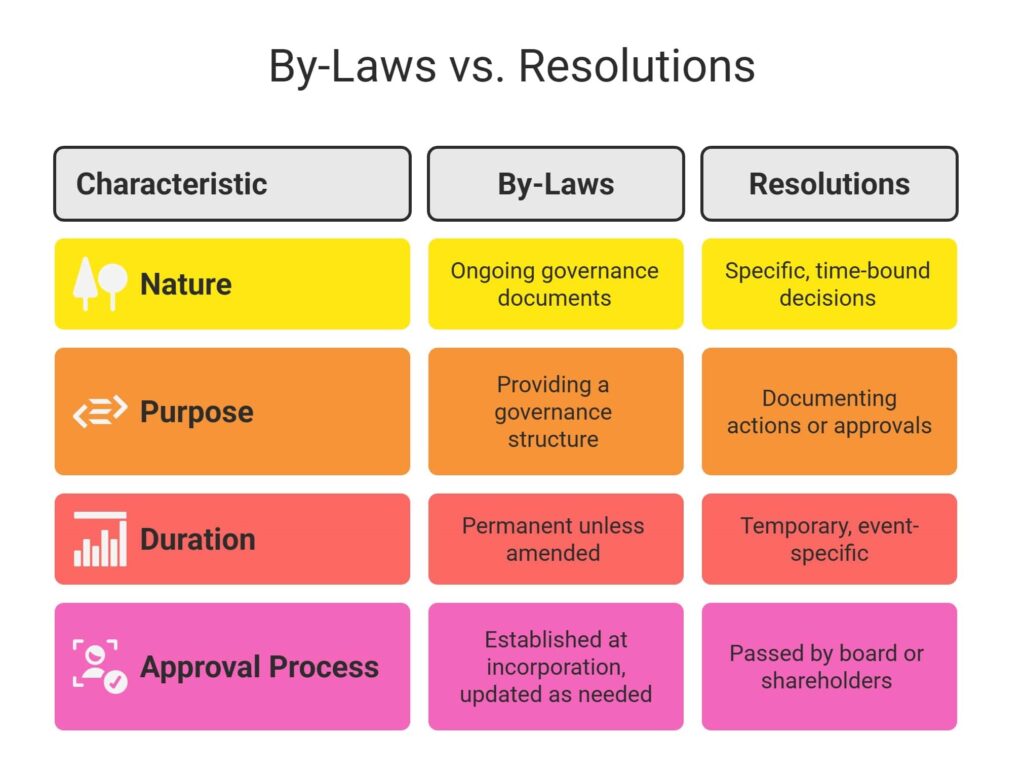Confused about by-laws and resolutions? Learn the legal differences between these governance documents and why they’re both essential for your corporation’s smooth operation. Get expert legal advice from Cloudhaus Law.
When you start a corporation in Canada, it’s not just about having a great idea: it’s about establishing a robust legal framework. Two critical components of corporate governance are by-laws and resolutions. While they may sound similar, they serve distinct purposes in how your business is managed and operated.
At Cloudhaus Law, we help businesses understand and implement these legal documents to ensure efficient corporate governance. Let’s explore the differences between by-laws and resolutions and why both are vital to your business structure.
What Are By-laws?
By-laws are the internal rules that govern how your corporation operates daily, acting as the company’s “internal constitution.” These governance documents establish the framework for decision-making, define the powers of the board of directors and shareholders, and include provisions for voting rights and dispute resolution.
By-laws are typically adopted during the first board meeting after incorporation and include key details such as:
- Director Duties: How directors are appointed, their roles, and procedures for removal.
- Shareholder Rights: Voting rights, share transfer processes, and shareholder entitlements.
- Meeting Procedures: Rules for annual meetings and special meetings, including quorum requirements.
- Financial Matters: Guidelines for managing company finances, profit distribution, and record-keeping.
By-laws are long-term rules that remain in effect until amended via a special resolution, ensuring consistent corporate governance.
What Are Resolutions?
Resolutions are specific decisions made by the board of directors or shareholders to approve or document particular actions. Unlike by-laws, resolutions are temporary and address immediate needs, such as:
- Appointing corporate officers (e.g., a CEO or CFO).
- Approving financial statements.
- Authorizing the hiring or removal of directors.
- Making significant business decisions, such as entering partnerships or selling company assets.
There are two main types of resolutions:
- Board Resolutions: Passed by the board of directors to approve actions like new business ventures or officer appointments.
- Shareholder Resolutions: Approved by shareholders during annual meetings or special meetings, often for major decisions like by-law amendments or mergers, typically requiring an ordinary resolution or special resolution.
Resolutions are situational, fulfilling their purpose once the action is completed, and are documented to ensure legal validity.
By-laws vs. Resolutions: Key Legal Differences

To clarify the distinction, here are the key differences between by-laws and resolutions:
- Nature: By-laws are ongoing governance documents that regulate corporate operations, while resolutions are specific, time-bound decisions.
- Purpose: By-laws provide a framework for corporate governance, whereas resolutions document particular actions or approvals.
- Duration: By-laws are permanent unless amended through a special resolution, while resolutions are temporary and apply to a single event.
- Approval Process: By-laws are established at incorporation and updated as needed, while resolutions are passed via board or shareholder votes, depending on the decision’s scope.
Why Both Are Important for Your Corporation
By-laws and resolutions are critical for maintaining effective corporate governance and ensuring legal compliance with the Canada Business Corporations Act or applicable provincial legislation:
- By-laws: Provide clarity on the roles, voting rights, and responsibilities of directors, shareholders, and officers, supporting dispute resolution and preventing internal conflicts.
- Resolutions: Ensure significant decisions are formally documented and legally valid, protecting the corporation from challenges during audits or legal disputes.
Without by-laws, your corporation lacks a clear governance structure, risking confusion and legal issues. Without resolutions, critical decisions may be questioned, potentially leading to financial or legal complications.
How Cloudhaus Law Helps You
At Cloudhaus Law, we assist businesses in drafting, reviewing, and updating by-laws and resolutions to ensure full compliance with Canadian corporate law. Whether you’re launching a new corporation or refining your corporate governance, our legal advice supports your needs:
- We customize by-laws to align with your business goals and operational needs.
- We guide you on when and how to pass board resolutions or shareholder resolutions, ensuring proper documentation.
- We provide ongoing support to maintain compliance as your corporation evolves, including by-law amendments when necessary.
Common Questions About By-laws and Resolutions
Do I need by-laws if my corporation is small?
Yes. By-laws are a legal requirement for all corporations in Canada, regardless of size, under the Canada Business Corporations Act or provincial legislation. They provide a governance framework and help prevent disputes.
Can resolutions change by-laws?
Yes, by-laws can be amended through a special resolution approved by the board or shareholders, as outlined in the original by-laws.
Are by-laws public?
By-laws are governance documents accessible to shareholders and often filed with government authorities upon incorporation, ensuring transparency.
How often do by-laws need to be updated?
By-laws should be reviewed periodically, especially after significant changes to the business structure. By-law amendments are necessary for updates to governance or operational rules.
Conclusion
By-laws and resolutions are foundational to your corporation’s legal health and operational efficiency. By-laws establish the governance framework, while resolutions document critical decisions, ensuring compliance with provincial legislation and the Canada Business Corporations Act. Understanding their differences and implementing them correctly protects your business and supports effective corporate governance.
At Cloudhaus Law, we’re dedicated to helping you manage these essential legal checklists & documents. Contact us today to ensure your by-laws and resolutions are tailored to your business needs and fully compliant with Canadian corporate law.






